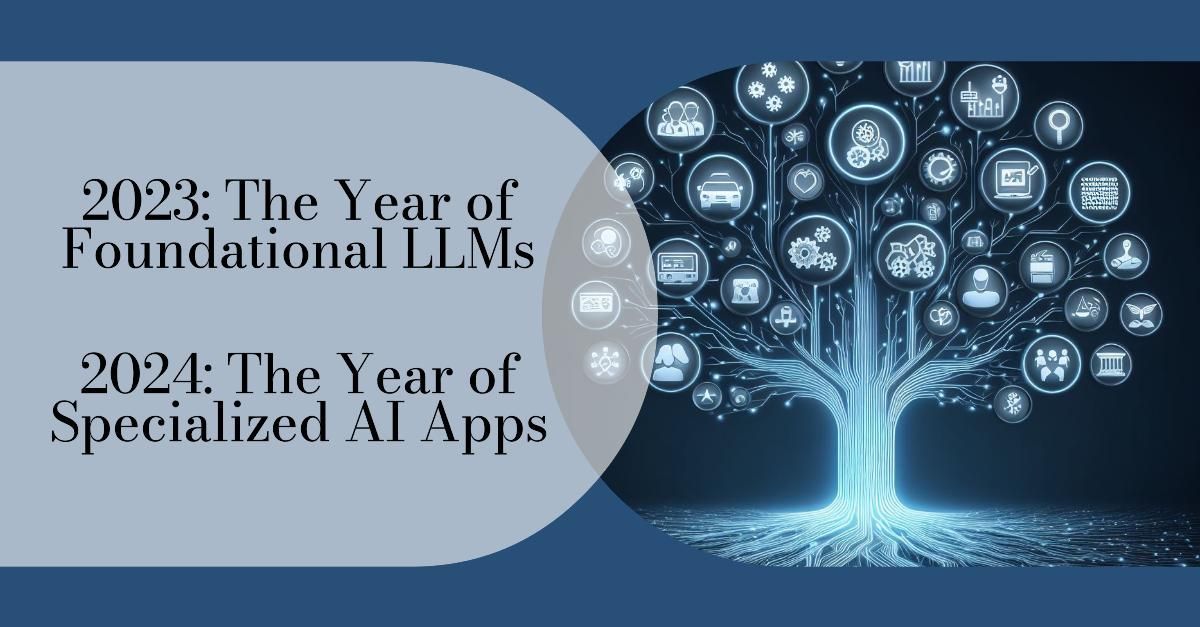The AI Ecosystem Evolves: Foundational Models Give Way to Specialized Implementations in 2024
The rise of specialized AI in 2024 will bring about a new era of intelligent, industry-specific solutions that will redefine the way businesses operate.

2023: The Year of the Foundational Language Model
2023 was a landmark year for artificial intelligence, with the rise of powerful foundational language models like GPT-4. These models, trained on vast amounts of data, demonstrated remarkable capabilities in natural language understanding, generation, and even coding. The potential applications seemed limitless, and the AI community buzzed with excitement over the possibilities these models unlocked.
The Limitations of One-Size-Fits-All AI
However, as the hype around foundational models settled, it became clear that these jack-of-all-trades AI systems had their limitations.
While they excelled at general tasks, they often struggled with the nuances and specific requirements of individual industries. Healthcare, finance, education, and other domains had unique challenges that demanded more targeted solutions. The need for specialized AI applications became increasingly apparent.
Moreover, while foundational models will continue to improve, they are likely reaching the point of diminishing returns. With this in mind, the highest value ROI will likely come from adapting foundational LLMs to specific industries and use cases, rather than trying to squeeze ever more performance out of a generic model.
Overcoming the Hallucination Hurdle
One of the biggest barriers to AI adoption in many industries, including law, is the issue of hallucinations.
Prominent examples of AI making up citations and even whole cases have led many to dismiss it as too dangerous for production use. However, specialized AI applications can overcome this hurdle by leveraging techniques like retrieval augmented generation (RAG).
By feeding a foundational LLM the full text of existing case law, a specialized AI application can check for hallucinations using traditional programming methods to search texts and validate citations. If the AI hallucinates, the traditional search can point that out and ask the AI to try again, ensuring the accuracy and reliability required for legal applications.
The Power of Specialization
Specialized AI offers several key benefits over generalist models.
By focusing on specific domains, these applications can achieve higher accuracy, as they are trained on industry-specific data and can better understand the context and terminology. They also offer improved efficiency, streamlining workflows and automating tasks that would otherwise require human expertise.
Moreover, specialized AI can provide a better user experience, with interfaces and features tailored to the needs of specific industries.
2024: The Rise of Domain-Specific AI Tools
As we move into 2024, we can expect to see a proliferation of specialized AI applications across various sectors:
- In healthcare, AI-powered tools will assist with diagnosis, treatment planning, and drug discovery.
- Financial institutions will leverage AI for fraud detection, risk assessment, and personalized investment advice.
- Educational platforms will use AI to create adaptive learning experiences and provide intelligent tutoring.
- Manufacturing and logistics will see AI-driven optimization of supply chains and predictive maintenance of equipment.
These are just a few examples of the many specialized AI applications that will reshape industries in the coming year.
Acknowledgements
- Article title generated with the help of Claude-3-Opus
- Article excerpt generated with the help of Claude-3-Opus
- Initial draft generated with the help of Claude-3-Opus
- Cover image generated by DALL-E-3
